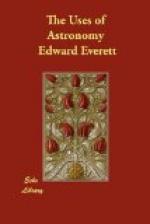States, and the determination of the boundaries of
the country. I believe that till it was done
by the Federal Government, a uniform system of mathematical
survey had never in any country been applied to an
extensive territory. Large grants and sales of
public land took place before the Revolution, and
in the interval between the peace and the adoption
of the Constitution; but the limits of these grants
and sales were ascertained by sensible objects, by
trees, streams, rocks, hills, and by reference to
adjacent portions of territory, previously surveyed.
The uncertainty of boundaries thus defined, was a
never-failing source of litigation. Large tracts
of land in the Western country, granted by Virginia
under this old system of special and local survey,
were covered with conflicting claims; and the controversies
to which they gave rise formed no small part of the
business of the Federal Court after its organization.
But the adoption of the present land-system brought
order out of chaos. The entire public domain
is now scientifically surveyed before it is offered
for sale; it is laid off into ranges, townships, sections,
and smaller divisions, with unerring accuracy, resting
on the foundation of base and meridian lines; and
I have been informed that under this system, scarce
a case of contested location and boundary has ever
presented itself in court. The General Land Office
contains maps and plans, in which every quarter-section
of the public land is laid down with mathematical
precision. The superficies of half a continent
is thus transferred in miniature to the bureaus of
Washington; while the local Land Offices contain transcripts
of these plans, copies of which are furnished to the
individual purchaser. When we consider the tide
of population annually flowing into the public domain,
and the immense importance of its efficient and economical
administration, the utility of this application of
Astronomy will be duly estimated.
[Footnote A: Humboldt, Histotre de la Geographie,
&c., Tom. 1, page 71.]
I will here venture to repeat an anecdote, which I
heard lately from a son of the late Hon. Timothy Pickering.
Mr. Octavius Pickering, on behalf of his father, had
applied to Mr. David Putnam of Marietta, to act as
his legal adviser, with respect to certain land claims
in the Virginia Military district, in the State of
Ohio. Mr. Putnam declined the agency. He
had had much to do with business of that kind, and
found it beset with endless litigation. “I
have never,” he added, “succeeded but
in a single case, and that was a location and survey
made by General Washington before the Revolution;
and I am not acquainted with any surveys, except those
made by him, but what have been litigated.”
At this moment, a most important survey of the coast
of the United States is in progress, an operation
of the utmost consequence, in reference to the commerce,
navigation, and hydrography of the country. The
entire work, I need scarce say, is one of practical
astronomy. The scientific establishment which
we this day inaugurate is looked to for important
cooperation in this great undertaking, and will no
doubt contribute efficiently to its prosecution.




